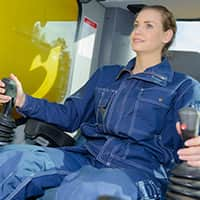Crane Operator Safety Training School
Written by Michael Purser | Edited by Nate Bortz

Crane certification opens many employment opportunities. Crane and rigging training prepares you to work with all kinds of heavy lifting devices. Cranes, derricks and hoists are important tools on many jobsites.
In 2023, crane and tower operators earned an average of $68,040. To become a certified crane operator (CCO), you need high-quality crane operator training.
This article will help you find the best school for crane operator training.
Preparing to Operate Safely
You need a complete education before you sit down to work the pedals and levers. Employers will only let you near the controls if you meet OSHA training requirements. Each industry and type of lifting device has its own OSHA standard. Construction requirements make up 29 CFR 1926 Subpart CC. Section 1427 deals with crane operator training requirements in the construction industry.
Other industries have similar standards. OSHA regulations include provisions for general industry, maritime and gear certification practices.
Federal regulations require all users to receive certification from a credentialed professional body. If you want to join this profession, you should pursue training that meets National Commission for the Certification of Crane Operators (NCCCO) standards. The organization is accredited by the ANSI National Accreditation Board (ANAB).
NCCCO approval is widely accepted and is the go-to standard for crane operators in the United States.
CCOs and the NCCCO
To remain impartial, the NCCCO doesn't offer its own training programs. It also doesn't officially endorse other programs. Instead, the NCCCO tests CCO applicants. To earn a certification, an applicant must pass knowledge and skills tests.
Load-handling equipment changes over time. The NCCCO requires CCOs to recertify every five years. Recertification requires operators to take the same theory and hands-on tests over again. Professionals with at least 1,000 hours in the seat don't have to repeat the practical exam.
Licensing
Certification is separate from licensure. 16 states and seven cities require a license to operate hauling equipment. In those jurisdictions, you may need both a certificate and a license to work with lifting machines. Refer to local authorities for license requirements.
Safety Hazards
Crane operator certification starts with safety training. Operating a complex machine is delicate work. Moving large, heavy loads demands strict attention and focus. Safety is a crane operator's number-one priority.
Lifting machines pose all four hazards in OSHA's “Focus Four.” These are the most common workplace hazards on construction sites. Hazards include falls, being caught in or between equipment, being struck by an object and electrocution. Struck-by incidents are the most common hazard.
From 2011 to 2017, over 50% of all fatalities involving lifting machines were caused by a worker being struck by an object or piece of equipment. Whether you are sitting in the driver's seat or just working around these large machines, you should prepare yourself with this Top 10 OSHA Violations course.
Those aren't the only workplace crane accidents. Equipment may collapse or topple over. In some cases, a vehicle-mounted lifter may overturn. When working near power lines, loads or masts may contact a live current.
If you want to become a certified operator, you need to complete safety training courses.
Crane Safety Training
To prepare for the job, master crane operator safety first. You don't have to look far to find a crane operator training school to get started. OSHA Education Center offers several online safety training courses, each designed for aspiring CCOs.
Begin training to become a crane operator with any of these basic safety programs.
Crane Safety in Industrial and Construction Environments
Learn important safety information, such as daily inspection and appropriate operating techniques. Prevent accidents through diligence. This course explores the most common hauling equipment hazards. Lessons prepare you to prevent injuries by carefully observing routine safety procedures.
Cranes, Derricks, Hoists, Elevators and Conveyors Safety
You may encounter many kinds of lifting equipment on the job. Learn the differences between these powerful machines. Discover the dangers inherent in rigging and moving heavy loads. This course will teach you safety techniques for many classes of specialized equipment. You will also master special precautions for working around power lines.
Study with Us!
With OSHA Education Center's internet-based safety courses, you can take the first step on the road to a career as a crane operator today! Our courses are all 100% online. You can start your lifting and rigging training from the comfort of your home.
Learn at your pace as you prepare for your NCCCO exam. Lessons are available 24/7 from any device. Log in, study and log out at any time. Enroll today!
